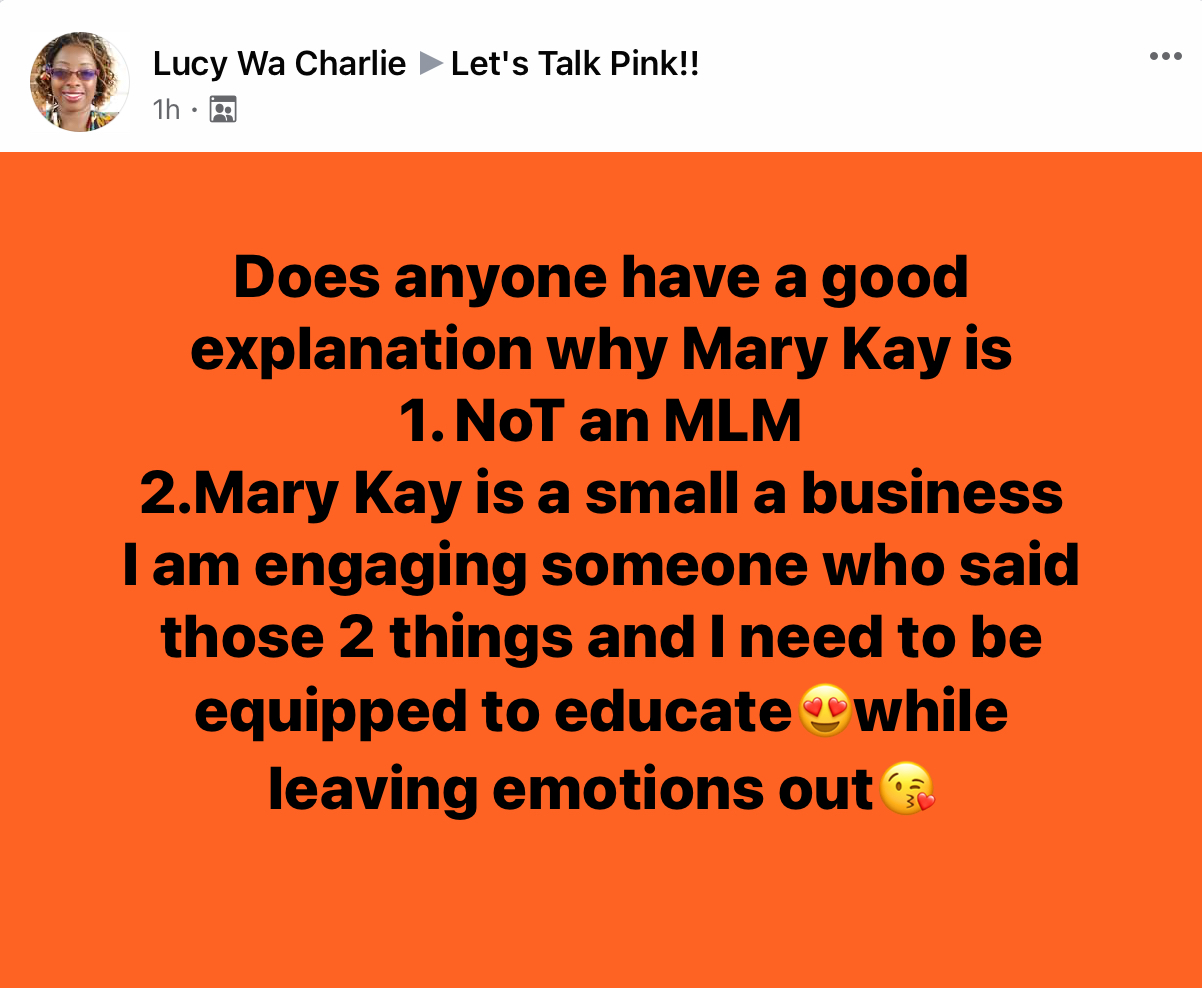The FTC’s Warnings on Pyramid Schemes
Is Mary Kay a multi-level marketing company (MLM) or is it a pyramid scheme? Does it really matter? Not really… both are essentially business opportunity scams that take money from millions and millions of households a year.
MLMs generally have an air of legitimacy about them, usually because they have a bona fide product that they are pretending to retail. Unfortunately, the products are usually of inferior quality or priced so high (or both) that little signficant retailing occurs.
The FTC put out the following about pyramid schemes. Make no mistake… the fact that the FTC has not shut down Mary Kay or other MLMs does NOT mean that they are "legal" or "legitimate." It merely means that the FTC has not shut them down. (Imagine speeding down a highway in your car but not getting a speeding ticket. Just because you didn't get a ticket, does not mean that you weren't speeding.)
I've highlighted in bold some of the points that apply to Mary Kay Cosmetics.
The Bottom Line About Multilevel Marketing Plans
Multilevel or "network" marketing plans are a way of selling goods or services through distributors. These plans typically promise that if you sign up as a distributor, you'll receive commissions – for your sales and those of the people you recruit to become distributors. These recruits sometimes are referred to as your "downline."
Some multilevel marketing plans are legitimate. However, others are illegal pyramid schemes. In pyramids, commissions are based on the number of distributors recruited. Most of the product sales are made to these distributors – not to consumers in general. The underlying goods and services, which vary from vitamins to car leases, serve only to make the schemes look legitimate.
Joining a pyramid is risky because the vast majority of participants lose money to pay for the rewards of a lucky few. Most people end up with nothing to show for their money except the expensive products or marketing materials they're pressured to buy.
If you're thinking about joining what appears to be a legitimate multilevel marketing plan, take time to learn about the plan. What's the company's track record? What products does it sell? Does it sell products to the public-at-large? Does it have the evidence to back up the claims it makes about its product? Is the product competitively priced? Is it likely to appeal to a large customer base? How much is the investment to join the plan? Is there a minimum monthly sales commitment to earn a commission? Will you be required to recruit new distributors to earn your commission?
Be skeptical if a distributor tells you that for the price of a "start-up kit" of inventory and sales literature – and sometimes a commitment to sell a specific amount of the product or service each month – you'll be on the road to riches. Often consumers spend a lot of money to "build their business" by participating in training programs, buying sales leads or purchasing the products themselves. Too often, these purchases are all they ever see for their investments.
Your Responsibilities
If you decide to become a distributor, you are legally responsible for the claims you make about the company, its product and the business opportunities it offers. That applies even if you're repeating claims you read in a company brochure or advertising flyer. The Federal Trade Commission advises you to verify the research behind any claims about a product's performance before repeating those claims to a potential customer.In addition, if you solicit new distributors, you are responsible for the claims you make about a distributor's earnings potential. Be sure to represent the opportunity honestly and avoid making unrealistic promises. If those promises fall through, remember that you could be held liable.
Evaluating a Plan
The FTC suggests that you use common sense when evaluating a multilevel marketing opportunity and consider these tips as you make your decision:1. Avoid any plan that includes commissions for recruiting additional distributors. It may be an illegal pyramid.
2. Beware of plans that ask new distributors to purchase expensive products and marketing materials. These plans may be pyramids in disguise.3. Be cautious of plans that claim you will make money through continued growth of your downline, that is, the number of distributors you recruit.
4. Beware of plans that claim to sell miracle products or promise enormous earnings. Ask the promoter to substantiate claims.
5. Beware of shills – "decoy" references paid by a plan's promoter to lie about their earnings through the plan.
6. Don't pay or sign any contracts in an "opportunity meeting" or any other pressure-filled situation. Insist on taking your time to think over your decision. Talk it over with a family member, friend, accountant or lawyer.
7. Do your homework! Check with your local Better Business Bureau and state Attorney General about any plan you're considering – especially when the claims about the product or your potential earnings seem too good to be true.
8. Remember that no matter how good a product and how solid a multilevel marketing plan may be, you'll need to invest sweat equity as well as dollars for your investment to pay off.
The FTC works for the consumer to prevent fraudulent, deceptive and unfair business practices in the marketplace and to provide information to help consumers spot, stop and avoid them. To file a complaint or to get free information on consumer issues, visit www.ftc.gov or call toll-free, 1-877-FTC-HELP (1-877-382-4357); TTY: 1-866-653-4261. The FTC enters Internet, telemarketing, identity theft and other fraud-related complaints into Consumer Sentinel, a secure, online database available to hundreds of civil and criminal law enforcement agencies in the U.S. and abroad.
Note about recruiting and commissions: Mary Kay claims that since you don't receive commission for "recruiting" but rather receive the commission for their inventory order, it is not a pyramid scheme. The bottom line is that commissions in Mary Kay are tied to recruiting, period. Recruit more, earn a higher percentage. They try to distinguish between just recruiting, and recruiting plus an inventory order. It's virtually the same thing.





 Visit the
Visit the
Name it and claim it. Blab it and grab it. Believe it and achieve it. If it does not fit,…
And that Wikipedia article links to another mental trick that they exploit big time: "The rhyme-as-reason effect, also known as…
I almost never comment on Raisinberry's posts because they're so good that I have nothing useful to add. This time,…
Thought stopping cliches, to short circuit your analytical brain by shoving a pacifier in it. https://en.wikipedia.org/wiki/Thought-terminating_clich%C3%A9
What a distasteful picture. She will have to put her groceries down first.